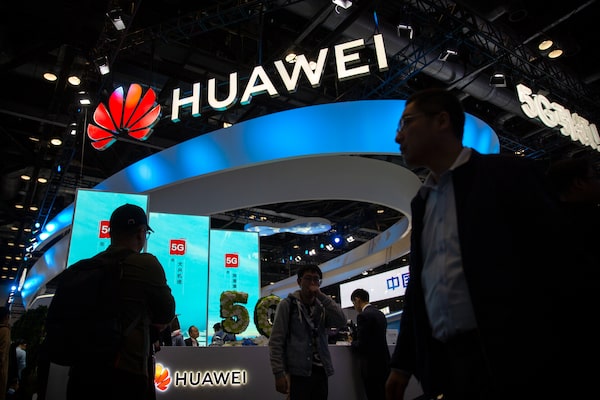
Attendees walk past a display for 5G services from Huawei at the PT Expo in Beijing, on Oct. 31, 2019.Mark Schiefelbein/The Associated Press
The Chinese tech company Huawei Technologies is still seeking patents for research it conducted in partnership with publicly funded universities in Canada, more than two years after Ottawa began restricting funding for academic collaborations with connections to foreign states considered national security risks, including China.
In the past two years, Huawei has filed patent applications for research on 5G wireless, artificial intelligence, semi-conductors and optical communications, done in collaboration with academics and inventors at the University of Toronto, McMaster University, Western University, the University of British Columbia and Queen’s University.
All of those universities, with the exception of Queen’s, told The Globe and Mail they are fulfilling pre-existing contractual partnership agreements, but that they intend to cut ties with Huawei and will not commit to new research collaborations with the company.
“The filing dates of these patents go back to early 2022, and it means Canadian universities are very actively building and transferring intellectual property to Huawei,” said Waterloo patent lawyer Jim Hinton, who provided the patent filing information to The Globe and also testified about the matter at the Commons committee on science and technology in October.
“All of the commercial rights to this property, which was invented by Canadians and funded by Canadians, are owned exclusively by Huawei.”
The filings were made after Ottawa announced new guidelines in 2021 for academics seeking federal funding from the Natural Sciences and Engineering Research Council (NSERC). These guidelines identified sensitive research areas of interest to foreign governments and militaries, and required any NSERC funding request to undergo a risk assessment by federal security agencies.
In March, Innovation Minister François-Phillipe Champagne instructed all federal granting agencies, not only NSERC, to screen funding requests from Canadian universities that are collaborating on sensitive research with China and other hostile states. The move was in response to an investigation by The Globe, which uncovered extensive collaboration between Canadian universities and Chinese military scientists.
When the government introduced the 2021 guidelines, it said they were intended to “prevent foreign interference, espionage, and unwanted knowledge transfer that could contribute to advancements in the military, security, and intelligence capabilities of states or groups that pose a threat to Canada or that may enable the disruption of the Canadian economy, society, and critical infrastructure.”
The measures were not retroactive, and they concern only federal funding. The federal government has not banned university partnerships with Chinese companies. Mr. Champagne’s office said Wednesday that Ottawa can’t regulate the activities of universities outside of federal research grants, because universities fall under provincial jurisdiction.
”National security is the responsibility of all partners: federal, provincial, universities and researchers alike,” said Mr. Champagne’s press secretary, Audrey Champoux.
Ottawa introduced the 2021 measures months after U.S. President Joe Biden extended a Donald Trump-era executive order that prohibited U.S. companies from using telecommunications gear made by Chinese companies such as Huawei and ZTE.
After cutting ties with Huawei, University of Waterloo must find funding elsewhere
Canada introduced its own ban on Huawei and ZTE equipment last year. The U.S., Canada and other countries claim that Huawei is beholden to the Chinese government, which could use the company to spy. Huawei, a world leader in 5G technology, has denied the accusation.
The universities that told The Globe they were ending their collaborations with Huawei said patent processes from previous partnerships with the company will take time to complete.
Leah Cowen, vice-president of research and innovation and strategic initiatives at the University of Toronto, said the university decided in April not to pursue any new research engagements with Huawei. The projects initiated before that time “will continue for some time based on well-established timelines for academic publications and patents,” she said.
McMaster University spokesperson Wade Hemsworth said his institution had also ended new research collaborations with Huawei, but has “a few relatively small projects that are being completed.”
He said patents often take 12 to 18 months to be processed or published, which means research collaborations that no longer exist may still be working their way through the process.
University of British Columbia spokesperson Kurt Heinrich said the university, like others across Canada, “will complete its legacy contractual research agreements with Huawei.”
“At this time, UBC is not undertaking any new research projects with Huawei,” he said.
Western University spokesperson Stephen Ledgley said the institution’s “remaining projects with Huawei Canada are in a wind down period and will come to an end in the next 16 months. We have no plans to engage in new research with Huawei.”
He added: “Western is committed to working closely with government agencies to ensure that Canada’s values and national security are at the forefront of all research conducted at the university.”
Queen’s University declined to comment on its research with Huawei, saying the school works “closely with government officials, particularly when considering compliance and security obligations and provisions.”
Mr. Hinton said it is a positive sign that most of these universities have committed to stopping research collaborations with Huawei. But he expressed concern that individual researchers could still work with the company.
“Huawei can go directly to the individuals and get IP that way,” Mr. Hinton said, using an abbreviation for intellectual property. “These professors get a good bump to their pay. If they sign a deal like this, they can have consulting gigs and other income streams with Huawei.”